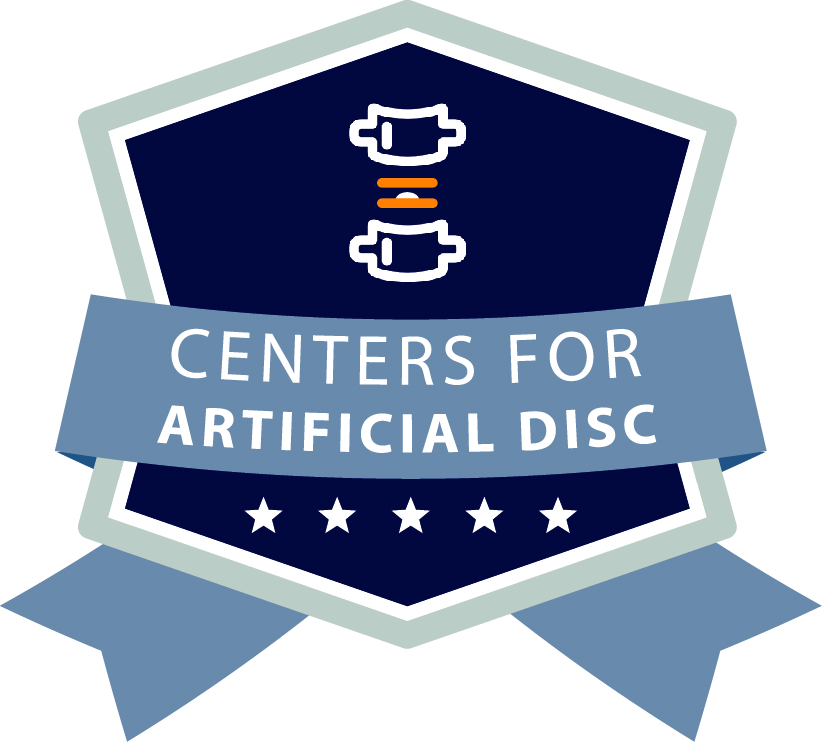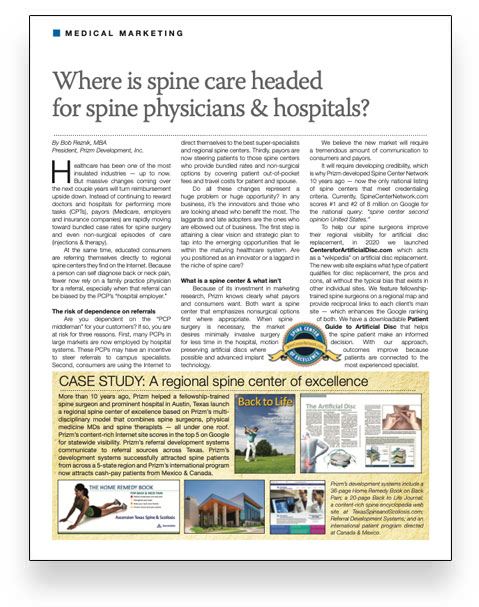Celebrating 30 years as the nation’s most experienced developer of spine & orthopedic centers of excellence.
- 817-481-2450
- Contact Us
-
Marketing
Spine Surgeon Marketing
How can a spine surgeon can differentiate his practice with a personal web site when employed by a hospital or within a large ortho or neuro group
How can a spine surgeon or spine specialist attract new patients when they are in a large orthopedic or neuro group or when employed by a hospital?
Within a large orthopedic group there may be a few internal referrals from the orthopedic physicians, but those referrals and patients are typically divided among all the spine surgeons in the group. Neurosurgical groups also can have internal competition for the best surgical patients. In both ortho and neuro groups referrals can also be biased by the personalities involved.
A similar marketing problem exists for spine surgeons who are employed by hospitals. Many hospitals don’t promote the reputation or capabilities of the spine surgeon. Instead many hospitals just promote the name of a hospital spine program hoping consumers will call a general number to be “assigned an appointment” by the hospital scheduling team.
However, in our 35 years of experience in spine center development, where we’ve surveyed THOUSANDS of spine surgery patients, that is NOT how patients select spine surgeons. Those pre-surgical patients who have long-standing back and neck pain and have disc-related symptoms including radicular pain or numbness/weakness into an arm or leg, want to know specific information about the training and experience of the spine surgeon.
Patients are looking specifically for answers to the following questions before they call for an appointment:
Can the spine surgeon do minimally invasive surgery through a half-inch incision with a tubular retractor so the patient can go home the same day instead of several days in the hospital? (The hospital wants a day in the hospital for billings, but the patient doesn’t want to be there to be exposed to infection or Covid.)
Is the spine surgeon proficient in artificial disc replacement, and which discs do they use? (We’ve never seen a hospital web site answer such questions.)
Does the spine surgeon do cervical AND/OR lumbar artificial disc replacement? (We’ve never seen a hospital web site answer such questions.)
Does the spine surgeon emphasize NON-surgical alternatives like spinal injections with an aligned physical medicine physician to prevent an unnecessary spine surgery? (Hospitals want surgeries. Patients want to exhaust non-surgical treatment options.)
Is the spine surgeon fellowship-trained in spine? (Consumers are becoming educated that fellowship training is desirable for specialists.)
Consequently, in our 35 years of experience developing spine centers, when a spine surgeon is employed by a hospital, that doesn’t typically represent an increase in primary care referrals. In fact, being affiliated with ONE campus can polarize other primary care physicians away from that surgeon, for fear that patients referred by the PCP into a competitive hospital campus will not come back to the referring doctor for ongoing primary care.
The hospital typically has a physician bio page and it’s left to the consumer to select a spine surgeon simply from a limited physician bio. Hospital web sites do not differentiate the spine surgeon from a sea of competitors — especially in a major market.
Consequently, the spine surgeon often experiences an anemic practice that operates well below their capacity which in turn affects their productivity and compensation because they fall short of lofty RVU productivity targets. Also from a professional standpoint, the spine surgeon is often receiving the type of cases they don’t find intellectually stimulating. If they would prefer complex cases, they often aren’t positioned as a regional expert to receive such referrals.
So in reality, with hospital employment and membership within a large neuro or orthopedic group, the spine surgeon’s compensation is dependent upon their personal productivity and surgical caseload. In this scenario it can be difficult for the spine surgeon to differentiate themselves and attract patients directly to their spine practice.
Prizm has developed dozens of personal web sites for spine surgeons who are either employed by a hospital or a member of a large orthopedic or neuro group. The Prizm educational content installed into the personal web site enables the spine surgeon to appear in on the first page of Google for queries specific to spine care and their city or region. Hospital web sites and large orthopedic groups rarely appear on the first page of Google for spine-specific consumer queries.
Prizm creates a personal web site for the spine surgeon that enables them to score in the top 10 on Google and other search engines for consumer questions and queries that are specific to spine surgery, spine symptoms from a herniated disc, and artificial disc replacement.
The second issue affecting spine surgeons who are employed is that they are dependent on the PCP “middleman distributor" for their spine, orthopedic or pain care patients? This creates three problems for the spine surgeon:
First, many primary care physicians in large markets are now employed by hospital systems. In many cases, these employed PCPs can have a financial incentive to refer to their hospital campus specialists ... no different than how a retail distributor is influenced.
Second, consumers are using the Internet to bypass PCPs and direct themselves to the best super-specialists and regional centers, especially when they have a health issue that can be self-diagnosed (e.g. back pain, hernia, joint pain, eye problem, cosmetic surgery issue, etc.)
Third, employers and insurance companies have a financial incentive to steer to “regional specialty centers” — especially those providing predictable bundled rates.
Prizm can help specialists keep existing referral streams and develop new referral sources from an expanded geographic market. That’s because an educated patient WILL travel out of a secondary market for the best specialist.
Prizm’s spine surgeon marketing includes a heavy marketing emphasis communicating to chiropractors who provide non-surgical treatment options to back and neck pain sufferers. The well-trained chiropractor wants and needs a trusted spine surgeon resource who will be conservative and not overly aggressive with spine surgery.
Lastly Prizm goes “direct-to-consumer” with promotion that enables patients to bypass captive PCP networks and seek out advanced specialists in minimally invasive surgery. The pre-surgical patient then is connected directly to the right specialist for their particular symptom set. This is accomplished with the highly educational personal Internet presence, and many social media communication options.
With Prizm’s approach to spine surgeon marketing EVERYBODY wins:
The educated patient WINS because they are connected to the best spine surgeon for their problem and will have a better clinical outcome, instead of being sorted by a hospital clerk based on a simplistic sorting protocol that doles out patients randomly without any connection of symptom set to spine specialist.
The spine surgeon WINS because they are getting patients that relate to their area of expertise. They do MORE cases in that spine niche and consequently their outcomes improve with volume.
The hospital WINS by capturing more surgical cases.
Disclaimer:
The pictures displayed in this website are images of physicians, patients and employees who have consented to have their pictures in this website. If you are viewing in Internet Explorer 8 or older you may need to update your browser.
RELATED TOPICS
Marketing Print Promotions Ad Campaigns Web Site Development Referral Development SystemsHAVE A QUESTION?

Wouldn’t it be convenient if someone created a listing of spine centers of excellence across the United States that all emphasize non-surgical treatment options before surgery?
Finally, there is a place.

Centers for Artificial Disc is the only verified national listing of spine centers that specialize in artificial disc replacement surgery.
CentersForArtificialDisc.com